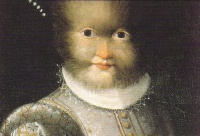Wonder (emotion)
From The Art and Popular Culture Encyclopedia
|
Plato said in Theaetetus that "philosophy begins in wonder", a view which is echoed by Aristotle: "It was their wonder, astonishment, that first led men to philosophize and still leads them. (Metaphysics)" "Wie? Das Wunder nur ein Fehler der Interpretation? Ein Mangel an Philologie?"--Friedrich Nietzsche, Jenseits von Gut und Böse |
|
Related e |
|
Featured: |
Wonder is an emotion comparable to surprise that people feel when perceiving something very rare or unexpected (but not threatening). It has historically been seen as an important aspect of human nature, specifically being linked with curiosity and the drive behind intellectual exploration. Wonder is also often compared to the emotion of awe but awe implies fear or respect rather than joy.
History
French philosopher, mathematician, scientist, and writer René Descartes (1596–1650) described wonder as one of the primary emotions because he claimed that emotions in general are reactions to unexpected phenomena. He noted that when people first encounter a surprising or new object, "... this makes us wonder and be astonished at it". Descartes therefore propounded that "Wonder is the first of all the passions." (Descartes The Passions of the Soul Article 53.) But Descartes, unlike the Greek philosophers before him, held a fundamentally negative view of wonder: "Although it is good to be born with some kind of inclination to this passion [wonder] because it disposes us to the acquisition of sciences, yet we ought afterwards to endeavor as much as we can to be rid of it." (Descartes The Passions of the Soul 2 Article 76.)
This sentiment is reflected in other early modern authors like Thomas Hobbes in his discussion about the English words Curiosity, Joy and Admiration. Hobbes argued that since "... whatsoever therefore happeneth new to a man, giveth him hope and matter of knowing somewhat that he knew not before", which creates "...hope and expectation of future knowledge from anything that happeneth new and strange", a "passion which we commonly call ADMIRATION; and the same considered as appetite, is called CURIOSITY, which is appetite of knowledge."
In De Homine XII, Hobbes discussed the “joy” of “admiration” again contrasting humans to other animals. Hobbes argues that "...this passion is almost peculiar to men." He pointed out that "even if other animals, whenever they behold something new or unusual, admire it as far as they behold something new or unusual" so that they can determine if it dangerous or harmless, men, "when they see something new, seek to know whence it came and to what use they can put it."
In The History of Astronomy, Adam Smith dwells on wonder not to explain the difference between human and animal thinking only, but rather to explain why we study natural science. An un-civilised person, or child, is still clearly different from other animals because “it beats the stone that hurts it”. The child is concerned with finding an account of cause and effect, but it is limited in its ability to do so.
- But when law has established order and security, and subsistence ceases to be precarious, the curiosity of mankind is increased, and their fears are diminished. [...] Wonder, therefore, and not any expectation of advantage from its discoveries, is the first principle which prompts mankind to the study of Philosophy, of that science which pretends to lay open the concealed connections that unite the various appearance of nature; and they pursue this study for its own sake, as an original pleasure or good in itself, without regarding its tendency to procure them the means of many other pleasures.
In The Tangled Wing, Melvin Konner reviews the biologist’s view of this pain and pleasure of learning. He notes that "If the problem is too unfamiliar, it will evoke attention; if it is difficult but doable, it will evoke interest, attention, and arousal and, when solved, it will evoke pleasure, often signalled by a smile." (p. 242) He says that “wonder” is “the hallmark of our species and the central feature of the human spirit”.
Concerning the special importance of wonder (thaumazein in Ancient Greek) to philosophy see Plato Theaetetus 155D and Aristotle Metaphysics I.ii.982b11-24. For Aristotle also see Poetics IV: “understanding [manthanein] gives great pleasure not only to philosophers but likewise to others too, though the latter have a smaller share in it”. Indeed, he says, people like looking at images because of the pleasure of contemplating [theôrizein] what something is through manthanein and syllogizesthai (syllogism: a bringing together of logoi or accounts). We even “enjoy contemplating the most precise images of things whose sight is painful to us”.
Etymology
From Middle English wonder, wunder, from Old English wundor (“wonder, miracle, marvel, portent, horror; wondrous thing, monster”), from Proto-Germanic *wundrą (“miracle, wonder”), from Proto-Indo-European *wen- (“to wish for, desire, strive for, win, love”). Cognate with Scots wunner (“wonder”), West Frisian wonder, wûnder (“wonder, miracle”), Dutch wonder (“miracle, wonder”), Low German wunner, wunder (“wonder”), German Wunder (“miracle, wonder”), Danish and Swedish under (“wonder, miracle”), Icelandic undur (“wonder”).
The verb is from Old English wundrian, which is from the noun wundor (“wonder, miracle, marvel”), as above.
See also
- The Wonders of the World, various lists to catalogue the world's most spectacular natural wonders and manmade structures
- Philosophical methodology





